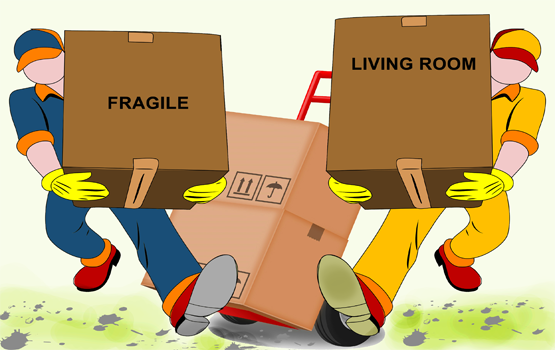Moving Tips
Figure out your move strategy and create moving plan. Take your moving plan a step further and create a master moving plan on an oversized calendar. Spend some time planning your daily tasks and write them into the empty boxes on the calendar. After your daily task is finished, cross it done. You will be surprised how much more you can accomplish when you follow your plan and know what you need to do in advance. Also, by braking up your moving plan into daily task, you are making it more manageable and less stressful.
Moving or Track Rental Companies
Get two or three estimates from moving or truck rental companies well in advance of your move. Check to see if you need any moving permits.
Don't forget to communicate with your moving company, choose the right size transportation and let your movers know what to expect. Explain all the requirements and expectations prior to booking.
Once you know your moving date, reserve a moving date and time. Don't forget to arrange for packing materials and assistance for moving furniture and appliances.
How to Start
Start a file for all your moving paperwork (estimates, receipts,etc).
Make an inventory of your household goods and begin to remove clutter (start with the basement, attic, garage, and other storage areas).
Start packing early, and read our packing tips and find out how to get packed up before the big day.
Get your new home ready - Contact carpenters, painters, plumbers, etc., so your home is ready when you arrive.
Arrange for utilities and insurance for your new home.
Create a floor plan of your new home for furniture and appliance placement.
If you've made some new purchases, such as new furniture or appliances, schedule the delivery prior or after moving day to avoid any congestion between delivery people and the movers.
Make any travel plans necessary for your move.
Prior to Moving
Transfer prescriptions and be sure you have an adequate supply of medications on hand.
Four weeks prior to moving day start using foods and cleaning supplies that cannot be moved.
Collect plenty of packing materials, variety of boxes (large medium and small), plastic containers, tapes, labels, and enough packing paper to ensure items stay protected.
Buy a roll of stretch wrap and use it to protect your furniture and appliances from scratches and damages. You can also use stretch wrap to group smaller boxes or items together, wrap it over dresser drawers with all their contents to save time on packing and unpacking them.
If you're relying on family and friends to help you with your move, don't forget to ask them early and give them at least 3 to 4 weeks notice before your moving date. Send out an email or text message with the details of where to meet, what time and what to bring, so everyone is informed and on the same page.
Service your car in preparation for the move. If you're moving from a warm climate to a cold one, check your antifreeze.
Properly dispose of items that cannot be moved, such as flammable liquids.
If you are moving in or out of an apartment, arrange for use of the elevator.
Make child-care and pet-care arrangements for moving day.
Assemble a file folder of information to leave for the new owner of your home.
Return any borrowed items (including library books) and retrieve any loaned items.
Pick up laundry -- Laundry tickets are easy to misplace, so ask for your things by name and not just by the receipts you have.
Find new homes for plants and other things that will not be moved.
Pick up change of address cards and notify post office and delivery services at least one week ahead of your moving time so your bills, packages, financial and credit card statements, papers, magazines, and other items can arrive on time and without hassle.
Notify the utility companies at least week ahead of your move and make arrangements to shut their services off and take final reading. If you have "last month" deposits with services, such as the telephone company, gas company or any other company, request your refund. Also don't forget to figure out when you need to return their items (like cable boxes, remotes, cords) if aplicable.
Final Preparations
Set aside anything that will travel in your car so it will not be loaded on the truck.
One day prior to moving day, disconnect and prepare major appliances for move. Defrost refrigerator and freezer, propping doors open.
Make sure everything is packed up and ready for the movers to avoid delays and possible additional charges.
Treat your helpers and movers regardless of whether or not they’re being paid to do the job. Have food and beverages readily available for everyone, they will appreciate it. You can order pizza, or order some other food and get it delivered to you.
Keep all envelopes for at least one month after move so you can be sure everyone is sent a change of address form.
Sponsored content:
BUYER INFO
Buying a home is beginning of an exciting adventure and for most buyers it is the biggest financial investment of their lives. Yet a great number of people follow emotional impulses to the exclusion of sound thinking when they make an offer on a property they want to buy. Very often they regret their lack of good sense.
Read more...
SELLER INFO
If you currently own property and are thinking of placing it on the market, get informed about preparing your home for sale, pricing your property appropriately, marketing it effectively and learn everything you can about real estate sale process so you can maximize your chance of a profitable sale by avoiding costly marketing mistakes. Read more...
Do you want to view more moving tips? view more
Sponsored content:












